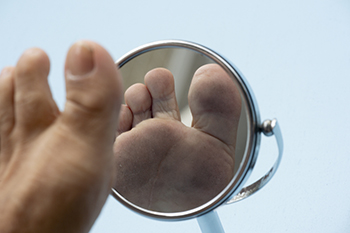


 Diabetic foot ulcers (DFUs) are wounds that can form on the feet of people with diabetes. Due to the combination of diabetic neuropathy and poor circulation that many people with diabetes experience, these wounds can often go undetected in their early stages and tend to heal slowly and poorly. The more severe the wound, and the longer it remains untreated, the more likely it is that there will be complications. Early detection and treatment of these wounds is crucial to the overall health of a person with diabetes. Daily visual inspections of your feet can be done at home as a preventive measure to check for any abnormalities or changes in the appearance of your feet. Take note of any cuts, scrapes, sores, discoloration, or strange sensations like pain, numbness, or tingling. If you notice anything unusual, it is suggested that you schedule an appointment with a podiatrist as soon as possible.
Diabetic foot ulcers (DFUs) are wounds that can form on the feet of people with diabetes. Due to the combination of diabetic neuropathy and poor circulation that many people with diabetes experience, these wounds can often go undetected in their early stages and tend to heal slowly and poorly. The more severe the wound, and the longer it remains untreated, the more likely it is that there will be complications. Early detection and treatment of these wounds is crucial to the overall health of a person with diabetes. Daily visual inspections of your feet can be done at home as a preventive measure to check for any abnormalities or changes in the appearance of your feet. Take note of any cuts, scrapes, sores, discoloration, or strange sensations like pain, numbness, or tingling. If you notice anything unusual, it is suggested that you schedule an appointment with a podiatrist as soon as possible.
Wound care is an important part in dealing with diabetes. If you have diabetes and a foot wound or would like more information about wound care for diabetics, consult with our podiatrist from Dr. Powers Foot and Ankle. Our doctor will assess your condition and provide you with quality foot and ankle treatment.
What Is Wound Care?
Wound care is the practice of taking proper care of a wound. This can range from the smallest to the largest of wounds. While everyone can benefit from proper wound care, it is much more important for diabetics. Diabetics often suffer from poor blood circulation which causes wounds to heal much slower than they would in a non-diabetic.
What Is the Importance of Wound Care?
While it may not seem apparent with small ulcers on the foot, for diabetics, any size ulcer can become infected. Diabetics often also suffer from neuropathy, or nerve loss. This means they might not even feel when they have an ulcer on their foot. If the wound becomes severely infected, amputation may be necessary. Therefore, it is of the upmost importance to properly care for any and all foot wounds.
How to Care for Wounds
The best way to care for foot wounds is to prevent them. For diabetics, this means daily inspections of the feet for any signs of abnormalities or ulcers. It is also recommended to see a podiatrist several times a year for a foot inspection. If you do have an ulcer, run the wound under water to clear dirt from the wound; then apply antibiotic ointment to the wound and cover with a bandage. Bandages should be changed daily and keeping pressure off the wound is smart. It is advised to see a podiatrist, who can keep an eye on it.
If you have any questions, please feel free to contact one of our offices located in Bloomington, Bedford, and Washington, IN . We offer the newest diagnostic and treatment technologies for all your foot care needs.